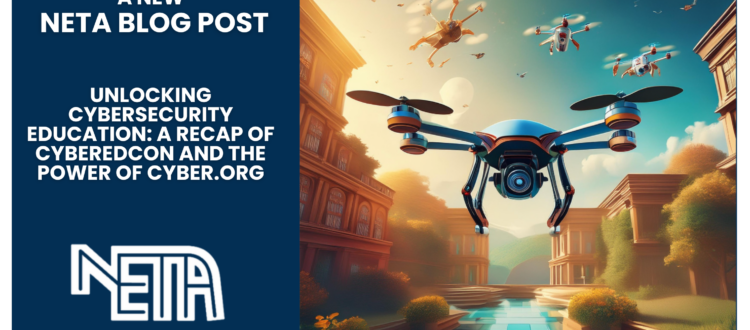Unlocking Cybersecurity Education: A Recap of CyberEdCon and the Power of CYBER.ORG
For educators looking to bring cutting-edge cybersecurity education into their classrooms, CyberEdCon is an invaluable experience. NETA President, Kyleigh Kumm, attended CyberEdCon at the beginning of June. Attending such a conference connects teachers with the robust and free resources offered by CYBER.ORG, a leader in K-12 cybersecurity education. As a K-12 educator, utilizing CYBER.ORG makes the implementation of cybersecurity obtainable.
Empowering Educators with Free Curriculum
CYBER.ORG, supported by a grant from the Cybersecurity Infrastructure and Security Agency (CISA), provides a comprehensive and entirely free curriculum designed for K-12 educators across the United States. This content spans from individual lessons to full-year courses, making it adaptable for various classroom needs. The curriculum emphasizes both foundational and technical cybersecurity knowledge, covering critical areas such as:
- Core Concepts: The CIA Triad (Confidentiality, Integrity, Availability), authentication methods, and identifying security threats.
- Threats & Defense: Understanding malware, social engineering techniques (e.g., phishing), and open-source intelligence (OSINT).
- Technical Skills: Linux commands, network fundamentals, packet analysis, secure device configuration, and IoT threat modeling.
- Advanced Topics: Cryptography (symmetric, asymmetric, digital signatures), network attacks (Denial of Service, spoofing, Man-in-the-Middle), wireless and mobile security, VPNs, penetration testing, exploits, and the basics of cyber warfare.
- Application Security: Web application vulnerabilities like cookie manipulation, input validation, SQL injection, XSS, and buffer overflows.
- Digital Citizenship: Exploring the ethical and legal aspects of digital activities and responsible online behavior.
- Career Exploration: Introducing students to various cybersecurity career opportunities and the skills required.
The K-12 Cybersecurity Learning Standards, developed by CYBER.ORG, are built around three core themes: Computing Systems, Digital Citizenship, and Security, ensuring a well-rounded understanding of the cyber landscape.
Hands-On Learning with the CYBER.ORG Range
A standout feature is the CYBER.ORG Range, a free, safe, and cloud-hosted virtual environment. This innovative platform allows K-12 students to engage in realistic, hands-on cybersecurity labs. Educators can lead their students through simulated cyberattacks and defense scenarios in a controlled setting, utilizing tools like Kali Linux and vulnerable Windows 7 machines. The range is accessible directly through a web browser, eliminating the need for specialized software or VPNs, making it incredibly convenient for schools. The use of the range allows students to be in a controlled environment that is functional on Chromebooks, Macs, and PCs. One showcased task on the range was exploring images to obtain metadata information in an interactive environment.
Flexible Implementation with Modular Curriculum
CYBER.ORG’s curriculum is highly modular and designed for flexible implementation. Courses like “Computational Thinking” and “Cyber Society” can be integrated as standalone classes or used to enhance existing subjects. This modular design allows teachers to customize content to fit their classroom schedules and specific learning objectives.
CYBER.ORG’s resources cater to the entire K-12 spectrum:
- Elementary School (Grades 1-5): Introduces fundamental concepts in an age-appropriate manner.
- Middle School (Grades 6-8): Builds upon foundational knowledge with more in-depth explorations.
- High School (Grades 9-12): Delves into advanced technical topics and career pathways.
Specific courses like “Cybersecurity Basics” are tailored for K-8, and “Coding Fundamentals” is available for Grades 4-12.
Seamless Integration with Micro:bits
For educators keen on incorporating physical computing, CYBER.ORG’s “Coding Fundamentals” course seamlessly integrates with Micro:bits. Students can learn block-based programming and Python, applying these skills to explore cybersecurity concepts directly on the Micro:bit devices.
Benefits for Educators
CYBER.ORG is committed to empowering teachers with the necessary tools and training. Benefits for educators include:
- Free Resources: Access to a vast library of free, high-quality cybersecurity curricula.
- Professional Development: Comprehensive instruction designed to lower the barriers to teaching cybersecurity, helping educators confidently deliver cyber content.
- Career Connection: Teachers can help prepare students for the growing demand in the cybersecurity workforce, connecting them with future career opportunities.
- Certification Programs: Opportunities like the cyber education certification program can further equip educators to become STEM and cyber leaders in their schools.
By leveraging CYBER.ORG’s resources, educators can provide their students with essential cybersecurity knowledge and skills, preparing them for an increasingly digital world and the exciting career opportunities within the cybersecurity field.
For more information and to access these free resources, visit the CYBER.ORG website. You can also learn more about the CYBER.ORG Range and their Coding Fundamentals curriculum.

